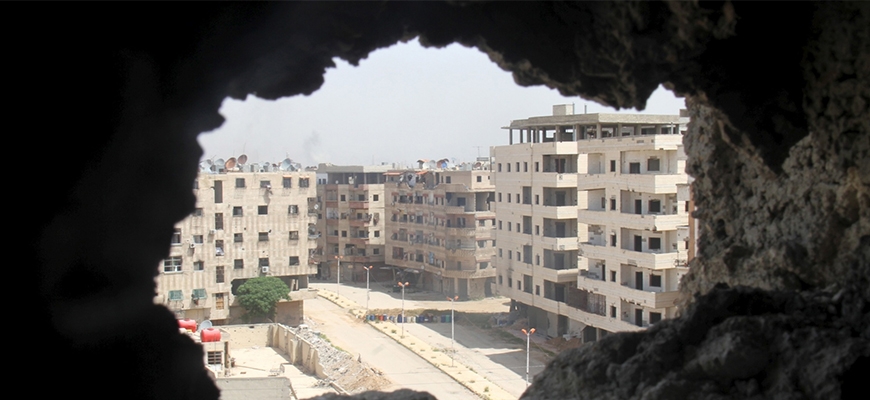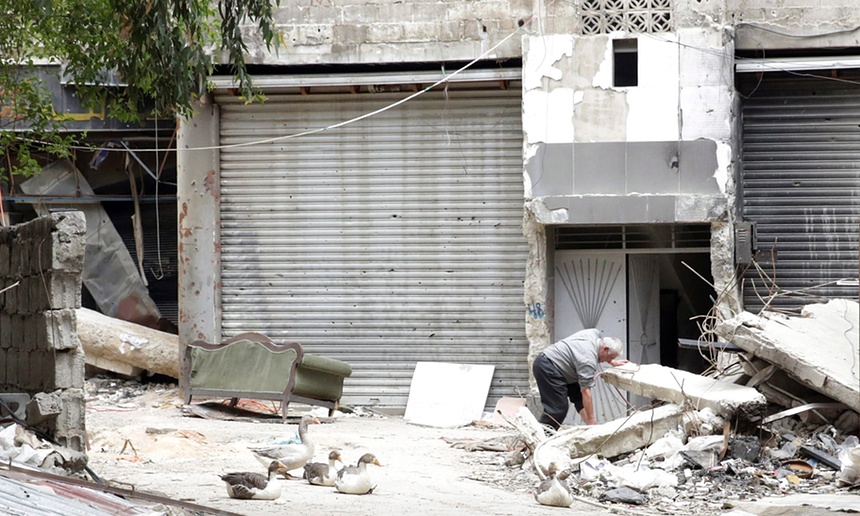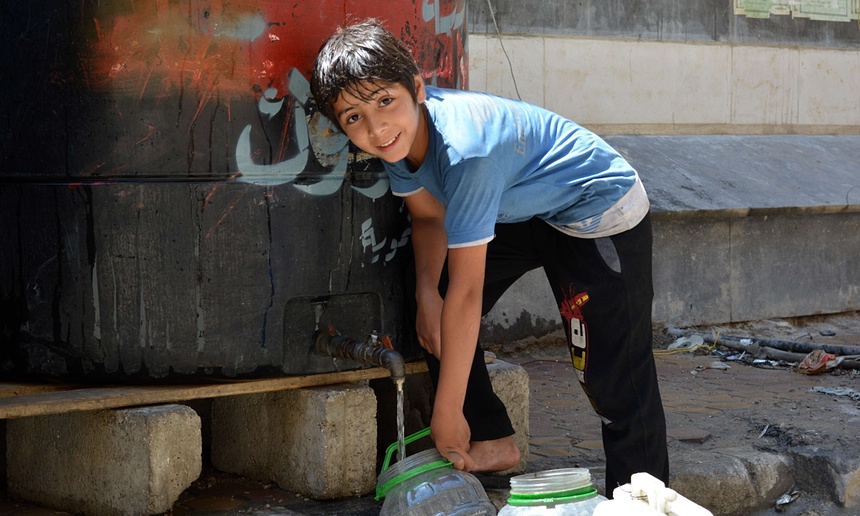
10 Jul 2015
Abdullah al-Khateeb pondered the sniper bullet that had pierced the window of his home close to the besieged Yarmouk refugee camp. Astonishingly, he was grateful. “The sniper had wanted to kill someone, but that hole has allowed a thread of sunlight to pierce through,” he said. “Everything has two sides. There is nothing that lacks beauty.”
For several months, Khateeb has been writing an account of life amid deprivation and starvation to mirror the Forty Rules of Love by the 13th century Persian poet and mystic Rumi. In his 35th entry, he wrote: “Under siege, beauty is an exceptional thing. Search for it, and if you happen to find it do not let it go, and if you do not find it, then try yourself to be beautiful.”
Yarmouk, Khateeb’s home, a once-bustling neighbourhood in southern Damascus and a symbol of Bashar al-Assad’s regime’s supposed dedication to the Palestinian cause, is in ruins after being starved of food, water and electricity by the government in a brutal three-year siege. Now, the terror group Islamic State stalks what is left of the camp, a short drive from the heart of Syria’s capital.
Khateeb, 25, was a final-year student of sociology at Damascus University when the revolution began and has since dedicated his time to documenting it, as well as doing humanitarian work and training activists, many of whom have been killed, detained or forced to leave their homes. He moved to the outskirts of Yarmouk, to a village called Yalda, having fled Isis, which had attempted to kidnap him. He is also wanted by the Assad regime.
During a Skype interview from his home, Khateeb disconnects every half an hour. He has five laptops that he charges every night on a generator because electricity is cut off. The laptops belonged to activist friends who were killed, one on the first day Isis arrived as he tried to document the invasion with his camera.
“When you lose a lot in siege and war, your heart hardens; it becomes like stone,” Khateeb said. “With the first loss, you weep for three days. The second, for two days. The third, for one day. The 10th martyr, you bury them and weep and then laugh, as a way to mock the whole situation. You develop a conviction that we are all going to die, but the issue is the order. So as long as we live, we will work.”
When the uprising broke out in 2011, many youth in Yarmouk found a common cause. The neighbourhood’s 1 million residents included 800,000 Syrians who, along with the Palestinians, suffered the brutality of the Assad dynasty’s police state.
While the Assad family’s supporters have long touted their commitment to the Palestinian cause, his father had cracked down on the Palestinians during neighbouring Lebanon’s civil war, standing by as their refugee camps were besieged by Shia militias, and had arrested many activists in Syria itself.
Khateeb and his friends participated in demonstrations, but never organised anything inside the camp, which housed many refugees fleeing other parts of Syria, to keep it neutral. But, he said, the regime was determined to drag the Palestinians into the conflict, allowing local factions to distribute weapons at random for self-defence and demanding they act as local enforcers.
In response, rebels entered the camp, the Palestinian factions that were supposed to defend it withdrew and the regime responded with air strikes, many of which killed refugees. It slowly ramped up the siege, first limiting food, medical supplies and fuel, then finally imposing a total blockade that has lasted to this day.
Since then, Khateeb and his colleagues have documented about 170 deaths from hunger in Yarmouk, along with other deaths from wounds untreated because of the lack of medical facilities, staff and equipment. Close to two-thirds of Yarmouk’s children suffer from malnutrition.
“The regime has used all weapons, from direct weapons like shelling, air strikes, rockets, chemical weapons, to starvation and torture, so nothing is surprising,” he said. “They haven’t left a single method you can think of to make a people bow.” But instead of bowing, Khateeb carried on working, and he began writing about the siege.
“It’s these little details that let the observer know what being under siege means,” he said. “It is the worst social experience after imprisonment, because the siege is not just a method of physical attrition, it is more a form of spiritual attrition.”
The Forty Rules of Siege, of which 36 have been published so far on his Facebook page, draw from Khateeb’s experiences. One rule describes how the besieged must “walk on wind” because every tread may crush something that once provided nourishment. He hesitates before stepping on a plant in a nearby orchard that the animals usually eat, and which people in Yarmouk had to eat, because he may be faced with that hunger again. He remembers nights when all they had was boiling water flavored with spices because they could not have soup.
“During the siege, the idea of having a cup of tea was extremely difficult,” he said. “When I and the others would sit around and drink tea, we would feel a strange pleasure.”
“This is one of the positive things about the siege, it makes you feel the value of things, the simple things like drinking a cup of tea or sitting together and eating bread,” he added. “These things you take for granted, you feel their value. [You realise] that happiness is a decision, not something you search for. It is the things that we have in front of us, that we do not realise until we lose.”
Khateeb recalled how, in the early days of the siege when they still had some food, he and his friends would gather at a warehouse and grind lentils and bulgur to make bread. Then a purported regime shell struck, killing a friend who was sitting next to him. His blood spilling into the mixture.
“They tried to take away every beautiful ritual we came up with,” he said. “I could no longer go to this place.” The brutality of the siege has left Khateeb with a desire for “personal revenge” against a regime whose violence has meant that he had to personally bury about 10 of his friends. It was that brutality, he said, that had led to the rise of extremism in Syria, where Isis now controls roughly half the country’s landmass and Jabhat al-Nusra, the al-Qaeda affiliate, reigns as one of the most powerful rebel groups.
“Extremism is a result of extremism,” he said. “The revolution was peaceful, the regime acted with monstrosity, people carried weapons. The regime launched air strikes, more gunmen emerged. The regime used chemical weapons, people became Islamist. The regime killed women, people became Nusra. It became more extreme, people became Daesh (Isis).”
That is the basis of the 34th rule of siege: that oppression breeds extremism. Khateeb said the only way he was able to shield himself was that he never lost hope – in the annals of history, he said, no people has ever been subjugated forever.
“I cannot lose absolute hope,” he added. “The moment I lose hope I will either commit suicide or you’ll see me in the streets carrying the Daesh flag.”
Optimism is hard to come by in Yarmouk, where Isis holds sway. But Khateeb said it was the little details that inspired hope – the fact that schools never fully closed in the camp, that social development programmes carried on, that residents still put on plays and held poetry nights.
“A people that are still alive is a sign of victory,” he said. “So long as there are people painting, people playing piano, people getting an education, all of these are signs of optimism.” Khateeb was not surprised when Isis entered the camp in collusion with the local branch of Jabhat al-Nusra, many of whom had secretly pledged allegiance to Islamic State.
Still, he resents how the Syrian uprising is portrayed outside the country as a battle between the regime and Isis, which he described as a “cancerous organisation”.
“When Daesh entered, 10 people were killed in the fighting but, before that, 170 people died of hunger,” he said. “Those who see the events in Syria with the lens of Isis and extremism are partners in the massacre against the Syrian people.” “Yarmouk has been dying for three years,” he added.

 عربي
عربي
